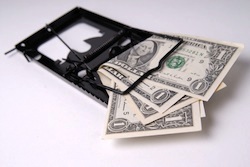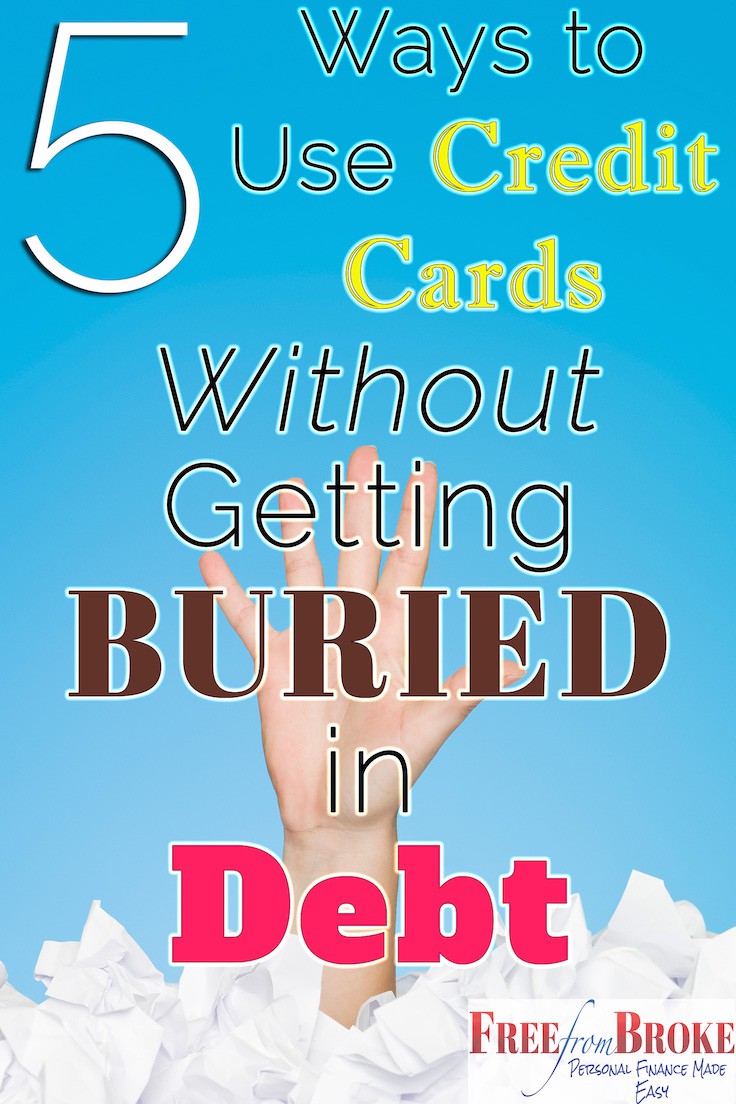Everyone knows the importance of using credit cards responsibly; the issue comes down to actually using them.
How do you use your credit cards to your advantage without also over using them to the point where they become a problem?
Let’s face it, credit cards are extremely user friendly!
Everything about them tempts you to use them even more.
From generous (and often rising) credit limits, to zero-interest introductory rates, to cash rebates and rewards, to the completely self-directed nature of the credit arrangement pull us into what is probably the most cozy relationship with any kind of debt we’ll ever have.
But credit cards are loans—as in debts that are required to be paid back.
If we ever lose sight of that we’re at risk of becoming credit card junkies or bankruptcy candidates.
How do we stay on the safe side of credit cards?
Read on and you’ll learn five techniques for credit cards to make sure you don’t get buried in debt. Remember, credit cards are a tool that can help us but only if we use them wisely.
5 Ways to Use Credit Cards Without Getting Buried in Debt
1. Use a Spending Hierarchy
One of the fundamental reasons people get deep in debt is through overuse of credit cards.
Paying with credit cards becomes the automatic method of payment for everything from a $4 cup of coffee at Starbucks to a $200 grocery order to a $4,000 room full of furniture.
Ironically, the larger the purchase the easier it is to track.
It’s the relentless flood of relatively small but everyday purchases that can lead to big problems.
I like to call this death by a thousand charges.
It’s not hard to add over $100 to your credit card balance in a single day of paying for nothing more than incidentals. $15 for an online purchase, $15 for lunch, $40 for gas and a $30 trip to the grocery store to “pick up a few things” is all it takes. Multiply that by 30 days and it’s not hard to see why so many people experience monthly credit card bill shock.
You can prevent this by working out a spending hierarchy, based on the amount of the purchase.
You could, for example, decide that any purchase for less than $25 will be paid in cash, any from $25 to $100 will be paid by debit card, then restrict your credit card to transactions above $100.
Fewer transactions with your credit card will mean a substantially lower bill each month.
2. Set a Maximum Balance That’s Well Below What the Card Issuer Allows
If you aren’t disciplined about using your credit cards it’s easier than you think to max them out.
Once you do that, the credit line becomes a complete liability—a large loan balance that needs to be paid down with no additional credit available to be used for future purchases.
It becomes a pure drain on your cash flow.
Whatever the maximum balance the card issuer allows, set your own maximum that’s much lower–preferably a balance you’re sure you can pay off in full each month. If you go above it, put your card away and go to all cash until you can pay the line off.
Here’s another reason to stay well below your credit card limit: one of the most important metrics in determining your credit score is credit utilization—that’s the ratio of credit outstanding to maximum credit available on a credit card. The higher that ratio, the greater the negative impact on your credit score will be.
3. Never Use Your Credit Cards as an Extension of Your Paycheck

The cost of living is always rising so it’s easy to see why people might use all kinds of ways to cope with this.
Using credit cards is, unfortunately, the quickest and easiest way to pay for what your paycheck no longer covers.
That’s how credit cards start to become an extension of your paycheck.
Credit cards are not an income source, but a way of borrowing against future income.
That means your future cost of living will be even higher because you’ll have to pay the added cost of paying back the money you’re borrowing to live today.
There are only two ways to deal with the rising cost of living effectively—either earn more money, or lower your expenses.
Credit cards do neither and when you start using them in this way you’re only creating a much bigger problem later.
4. Don’t Think of Your Credit Cards as an Emergency Fund
Do you know people who don’t have an emergency fund—and maybe think of the unused portion of their credit balances as filling that role?
I know some people who think like this.
There are at least two problems with this idea; the first is the definition of “emergency”.
For some that word means a medical catastrophe or a job loss—a true emergency by any definition. But to others an emergency can be any time they’re short money in their monthly budget!
It’s easy to see where that can lead.
The second problem is that it can mask a lack of savings.
If you don’t have at least an emergency fund saved, you’ll be completely dependent on credit cards any time you need some extra money. Savings are the best way to avoid the kind of imagined emergencies that can max out your credit lines. If you have no savings of any kind, it’s just a matter of time until that day will arrive.
Savings are savings, and credit is debt—never mistake one for the other.
5. Pay Your Card Balance Off In Full Each Month
This is the most widely used advice on credit cards, which is why I held it for last.
We’ve all heard this advice before, but it’s one of those pieces of wisdom that’s easier to recite than it is to put into practice.
But if you follow the other four methods above, paying off the balance each month should be so much easier. This is so important I’ll repeat it: pay off your card balance in full each month!
When you pay your balance in full you’re making sure you stay within your means and you are also avoiding credit card interest charges. Interest charges are an insidious way for your credit card debt to grow without you noticing.
Final Word on Using Credit Cards and Avoiding Debt
I’ve said it many times — credit cards are a great tool.
But only when you use them well. If you aren’t disciplined credit cards can quickly lead you down a road to debt. Follow the guidelines above and you’ll have a framework to make sure credit cards are a tool that works for you rather than you being a tool that works for credit cards.

Another big negative for relying on CCs for an emergency fund is if you lose your job and the CCs find out they may cancel them or severely cut your limit, not that I think they should be used as an E-fund anyways.
I always ask myself if I can pay whatever I am putting on my credit card off today. If the answer is yes and it is budgeted for than I have no problem putting it on my CC. I pay it off in full EVERY month and have NEVER carried a balance. The most important rule in my opinion.
I agree about paying off your card every month – very important. Simple rule: if you can’t pay it off you can’t afford it.
Interesting point about losing your job. I don’t think I’ve ever heard of anyone losing their credit card after losing a job. Is this something you’ve come across?
Another good tip to using your credit card responsibly is to have the bills automatically deducted from the credit card and set up an automatic transfer from your checking to your credit card. This will guarantee you will pay off your credit card and keep your card active and score in check.
Great piece!
i actually earn ~500/month in rebate cash each month by charging business expenses on the cards. i also time payments to use as float so charges are made afterthe statement closes, this gives me a month and a half before the bills are due.
like all things, credit cards used wisely are an invaluable tool.
In my case, I’m using only to credit cards, one for online purchases, like domain renewals, hosting renewals, and other transactions which are limited to online shopping of clothing, kitchen-ware, etc strictly 4-5 times a year only. The other credit card I use is for shopping at malls and stores, where I restrict myself from temptation of shopping those ‘not-so-needed’ display items which, if i buy will add my CC bill heavily. So how I restrict myself from buying ‘not-so-needed’ fancy products? Well, I make a list of essentials to be bought and write it down on paper, I enter the store, and buy only and only those things on the list. The result? my CC bills are always minimum and manageable. Thus I can pay my CC balance full in the month and never buried in debt.
Excellent advice here Glen! I especially like your idea of setting a minimum limit on what purchases will go on the card. Those small purchases really do add up quickly, and before I know it my bill is several hundred dollars of “stuff”.
One thing I like to do, is pay my credit card bill in 2 payments within the same month. I get paid on the 1st and the 15th of every month, so it’s better for my budget to pay half at a time. This way I never get stuck with a full bill in case something else comes up.
Only get credit cards with rewards and understand all the rewards rules.
Automate #5 and you won’t see it as optional. If you set it up to “pay entire balance” every month you won’t overspend.
Excellent advice here Glen! I especially like your idea of setting a minimum limit on what purchases will go on the card. Those small purchases really do add up quickly, and before I know it my bill is several hundred dollars of “stuff”.
I like to pay my credit card bill every week so I’m never in for a shock. For example, if I charged a $100 this week, I make sure I pay off that $100 by Sunday night. I never make excuses for not paying that credit card bill.
The plus side is that my credit report is really good and I’m racking up miles for a ‘free’ plane ticket for my next trip..business class 🙂
Now why would anyone use a credit card and pay the balance in full when the bill comes?
What kind of a logic is it charging on a card that will add interest when you obviously have the cash on hand to pay for it with debit/cash???
Using a credit card this way is only good for building a score.
Ingrid, I’m not sure what you are asking? If you are paying the bill in full there will be no interest added. Many people do this for convenience (not having to carry cash), extra protections the card offers, as well as rewards, and more.